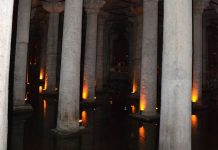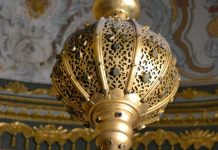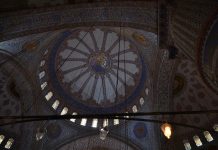These latter added their own quota of evil as fuel to the general conflagration fired by their ruler, and the result was nothing but confusion and trouble. What made it more terrible was the fact, that while the great majority were being plundered and stripped, the imperial treasury enjoyed not a penny of the profits built up from these embezzlements, for the rivers of money were being diverted elsewhere. The truth of this will be shown more clearly as the story progresses.
This particular emperor aspired to a reputation for piety. It is quite true that he was interested in religious matters, but there was more pretence about it than real piety; anyway, he appeared to be a pious man. In the first place, this led to extravagance in discussions about problems of divinity. He would examine causes and arguments which could not be explained by mere knowledge; only if one had recourse to Mind, without any interpreting medium, could the Mysteries be made intelligible.
In natural philosophy, however, he showed little interest, nor did he discuss such matters with the professors, except with those who claimed (unjustly) that they were disciples of Aristotle. Romanus’s studies, as one of our wise men said, were more profound, and dealt with objects comprehensible by Mind alone.
Holy and Ineffable Wisdom
That was the first way he devised of showing his piety. Later on, being jealous of the great Solomon, for his building of the muchvaunted Temple, and envious of the emperor Justinian, because of the mighty church that was named after the Holy and Ineffable Wisdom, he determined to build and found, by way of recompense so to speak, another in honour of the Mother of God.**35 It was a great mistake, for what was intended to be an act of piety, turned out to be the cause of evil and the occasion for many injustices.
The expenditure incurred over this church was constantly increased. Every day he collected more contributions than the work necessitated, and woe betide the man who tried to limit the building. On the other hand, anyone who invented fresh extravagances and new variations of style was sure of winning the emperor’s friendship at once. Every mountain w as bored for material, and the miner’s art esteemed higher than philosophy itself.
Of the stones thus obtained, some were split, others polished, others turned for the sculptures, and the workers on these stones were reckoned with the like of Pheidias and Polygnotus and Zeuxis.**36 Nothing in the whole world was thought good enough for this church. All the royal treasure was made available, every golden stream poured into it. The monies were exhausted, and yet the construction went on, for one on top of another new parts were added, and at the same time some other part would be pulled down.
Read More about Our Lady’s kindnesses in the past








